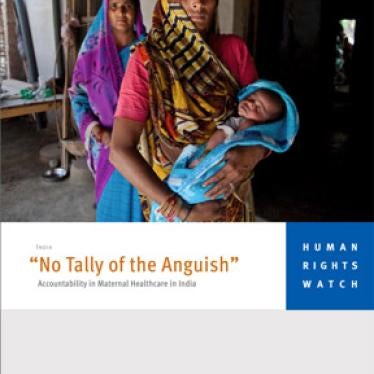Honorable Beverley J. Oda
Minister of International Cooperation
200 Promenade du Portage
Gatineau, QuebecK1A 0G4
Dear Minister Oda,
We write to support Canada's intention to make maternal and child health a priority for the 2010 G8 summit. We urge Canada and all G8 countries to support robust public health accountability measures and a comprehensive approach to sexual and reproductive health care. We believe these are critical for achieving progress on the Millennium Development Goals and for protecting fundamental human rights.
Human Rights Watch, a leading international human rights organization, has worked extensively on reproductive and maternal health issues over the past decade. Our investigations have revealed blatant disregard for women's and girls' rights to information, nondiscrimination, life, health, privacy, freedom from cruel, inhuman, and degrading treatment, and the right to decide on the number and spacing of children. From the insurmountable barriers to accessing contraceptives in Argentina to the inaccessibility of legal abortion after rape in Mexico to the failure to track maternal deaths in India, our research has exposed how health system failures, disparities in access to health care, and lack of accountability deprive women and girls of their rights. These failings need to be addressed both to make progress on the Millennium Development Goals, and out of basic respect for women's and girls' dignity and rights.
We applaud the Canadian government's commitment to building accountability mechanisms into international development efforts, and urge you to make accountability a cornerstone of the G8 conclusions this year. This stance is in line with the G8's Tokyo Framework for Action on Global Health. For purposes of promoting maternal and child health and rights, key elements of accountability must include (1) redressing past grievances and (2) monitoring and gathering data on health systems.
Grievance Redress Mechanisms
When maternal and child health care goes wrong, patients and families need a functioning redress system, and governments need to hear from them to improve quality of care. Grievance redress mechanisms should be (1) accessible to marginalized communities, especially rural women with low levels of education, (2) capable of conducting impartial, transparent, and efficient inquiries, (3) able to investigate the conduct of health workers and health system structures, and (4) capable of providing remedies that are constructive and forward looking as well as corrective. Such grievance redress mechanisms can enhance trust in the public health system, and its overall effectiveness.
Monitoring and Gathering Data on Health Systems
Health system monitoring helps governments better understand progress and failures, and can form the basis for effective public health strategies. Monitoring should be undertaken in accordance with World Health Organization and United Nations guidelines. Governments should set clear public health indicators and benchmarks, establish functioning birth and death registration systems, and improve their maternal death audits. To properly monitor the effectiveness of health interventions, data must be collected and disaggregated by socio-economic indicators such as education status, income, religion, and caste to reveal whether healthcare programs are accessible to and used by all communities. We therefore urge you and other G-8 countries to earmark funds to support efforts to document and disseminate best practices in creating accountability mechanisms.
In addition to promoting accountability within any G8 plans on maternal and child health, we urge you to take a strong stance on the value of a comprehensive approach to sexual and reproductive health care. This includes improving access to and increasing funding for family planning that involves both men and women and is non-coercive, making available a wide range of contraceptives based on full information and women's choice, and providing safe abortion and post-abortion care. Research by the Guttmacher Institute and United Nations Population Fund shows that maternal deaths in developing countries could be slashed by 70 percent and newborn deaths could be cut nearly in half if the world doubled its investment in family planning and pregnancy care. We applaud your involvement in the development of the United Nations-led Joint Action Plan for maternal and child health, and its emphasis on increasing financing commitments, and urge all G8 governments to commit to increased funding in this area.
Without accountability and comprehensive sexual and reproductive health care, the Millennium Development Goals on improving maternal and child health will continue to be out of reach for most countries. Worse still, the resources poured into health improvement schemes will likely not benefit the women and children for whom they are intended.
We would welcome an opportunity to brief you on these issues and our research, and remain at your service for any additional information.
Sincerely,
Liesl Gerntholtz
Executive Director, Women's Rights Division
Human Rights Watch






